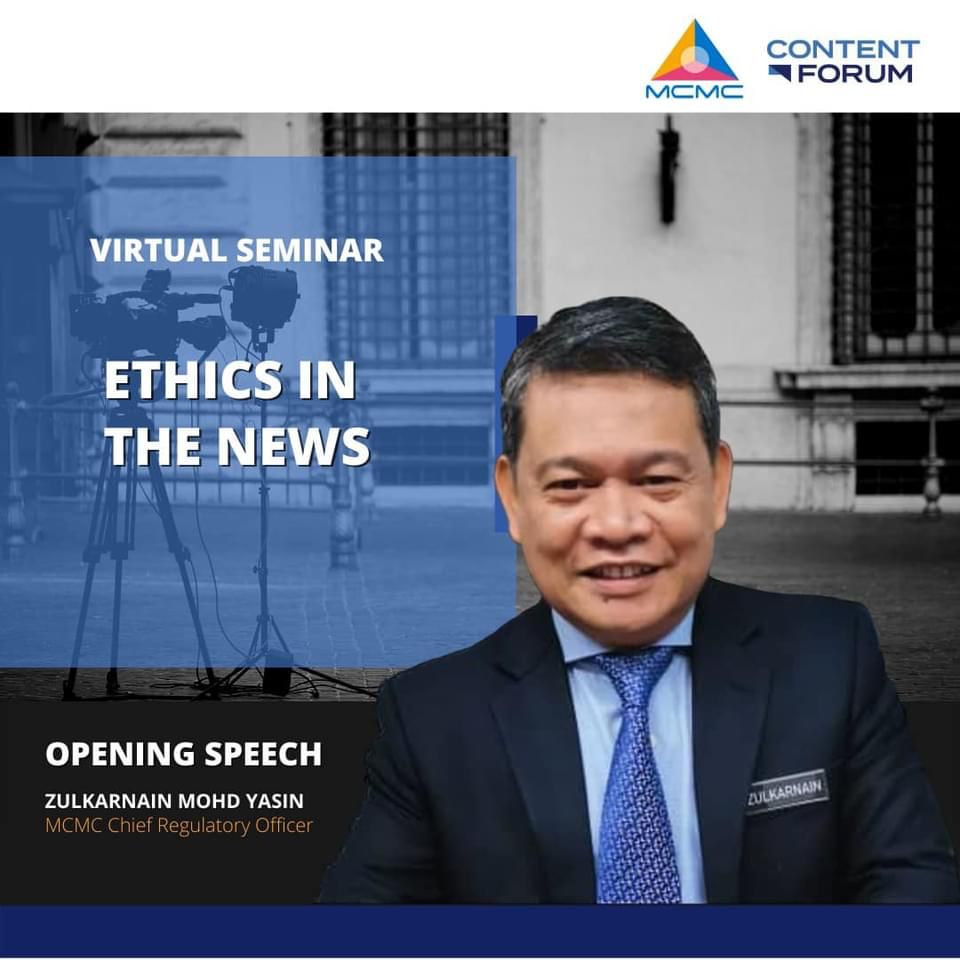By Muhammad Irfan
GOMBAK, 26 January 2022: Communications and Multimedia Content Forum of Malaysia in collaboration with Malaysian Communications and Multimedia Commission (MCMC) held a virtual seminar yesterday regarding ethics in the news where participants shared their experiences, insights and concerns on ethics in news reporting in Malaysia.
In his opening speech, the Chief Regulatory Officer of MCMC, Mr. Zulkarnain Mohd Yasin, highlighted the importance of news and the challenges of news broadcasting in todays climate.
He said: œWe can see news is important because it manages to garner around three to four million Malaysians’ attention every day. This shows that the public is very keen to know on issues around them.
œThe changing landscape of how news has been transmitted also comes with its own challenges in terms of immediacy of news. Nowadays, news is important as it carries critical information regarding issues or conversations of the public that may affect their safety and well-being.
Zulkarnain also mentioned how news is being transformed to adapt with current technology and its implications.
œThe advancement of technology also gives rise to many forms of news such as the transmission of news through social media and the birth of ˜citizen journalists.'”
Hence, Zulkarnain said through these changes, there will be challenges to regulators and broadcasters in the sense of their branding.
He emphasised: œSome problems that rise in news reporting these days include people trying to plagiarise other peoples work and also people trying to disseminate misinformation through the use of a news brand such as their logo.
In the opening remarks, Zulkarnain also stated the challenges faced by the general public with the transformation of news today.
œFor the general public, it is a challenge for them to determine whether the news are from the news broadcasters themselves or through another party impersonating as broadcasters. Thus, it is important to build a strong brand for news broadcasters, but it is also important to have a strong culture of the content that is broadcast.
œNews broadcasters need to have a high level of transparency, truthfulness and also ethics. Speaking of ethics, one of the most important elements in news ethics is balanced reporting. Though this might be challenging as there might be many stakeholders, balanced reporting is important to uphold ethics which ultimately reflects the credibility of the broadcasters, he said.

Meanwhile, Chairman of Content Forum Malaysia, Mr. Kenny Ong emphasised that since he is not a journalist he would only talk on the content in general for Malaysia.
He recapped issues surrounding the topic of œnews that included fake news, virality, unchecked news and money issues.
œThe biggest issue today is fake news. Fake news is further amplified now with COVID-19 as we can see people have a difficult time seeking real information.
“Most Malaysians dont refer to an actual news site to fact check their information, thus making it difficult for them to differentiate the authenticity of a news, he highlighted.
Kenny Ong continued, œThe second issue we need to deal with is virality. The need for news outlets to change their headlines to make it viral to a point it is clickbait makes people wonder whether it is ethical or not, since the content of the news does not necessarily reflect the headline.
œThe third issue is unchecked news. Nowadays we have ˜citizen journalists or ˜social media influencers who write their own stuff. Some of the main news outlets in our region use the news by these people and publish it on their site without fact-checking.
œMy last point is money. We cannot escape money as news has a relation to it as news is also business. For example, regardless if a news is in print or digital, there is money attached to it such as the presence of advertisements in between videos or podcasts.
On laws regarding news and content in Malaysia, Kenny Ong expressed: œIn Malaysia, there are a lot of laws that regulate news and content, and these are closely monitored by the authorities.
“The Content Forum also has its own content code which is self-regulatory that is specific to news and so on.”
He highly recommended for those up and coming journalists to keep themselves updated with the content code.
The virtual seminar held through Zoom and Facebook Live from 9 a.m. to 5 p.m. was joined by more than 100 participants. ***
